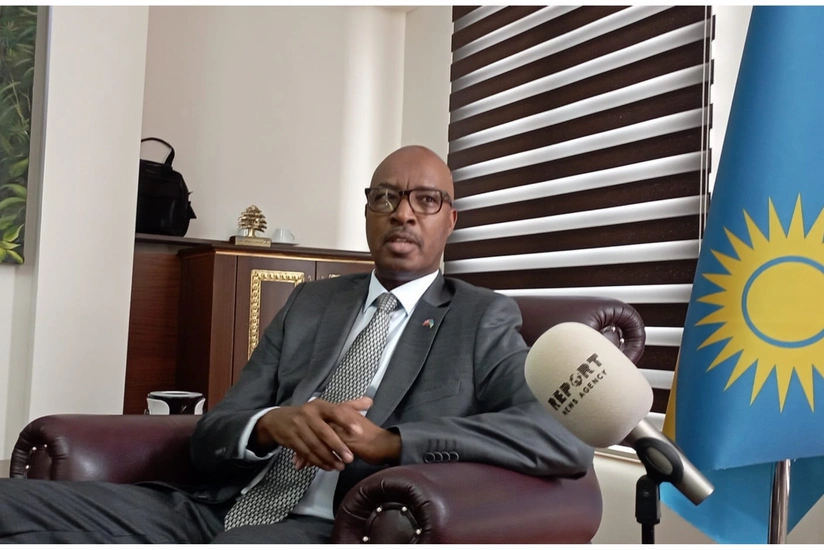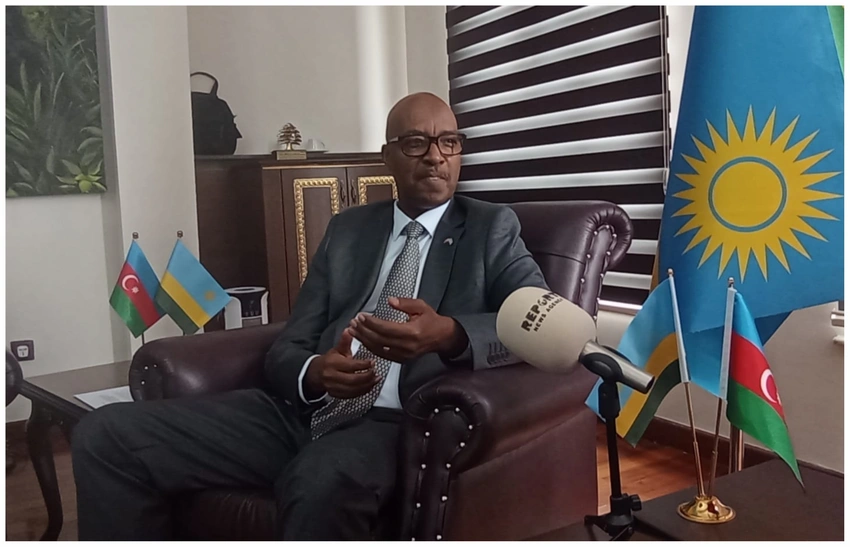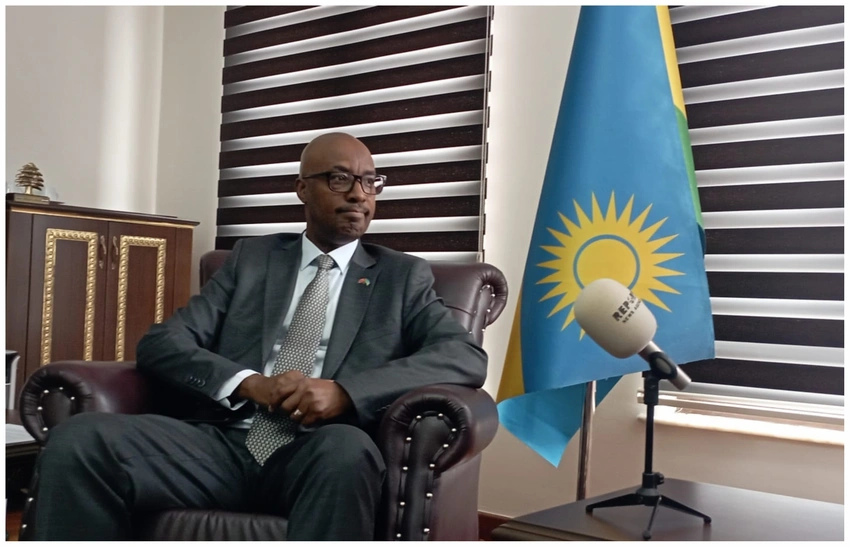Strategies used during the occupation of Azerbaijani lands identical to those used in Rwanda - INTERVIEW WITH AMBASSADOR
- 07 December, 2024
- 08:07

The non-resident Ambassador of Rwanda to Azerbaijan, Charles Kayonga, who recently presented his credentials to Azerbaijan's President Ilham Aliyev, spoke to Report's Ankara bureau about investment opportunities for Azerbaijani businessmen and companies in Rwanda, East, Central, and Southern African regions. The diplomat also shared his views on the COP29 climate conference held in Baku in November and addressed topics such as neocolonialism and genocide.
- What areas could be priorities for the development of relations between the two countries?
The main direction of my activities as Ambassador in Azerbaijan will be, first, to maintain and even strengthen political and diplomatic relations between our two countries. This will be done by encouraging high level political engagements and exchange between politicians and political institutions. The end state will be good political understanding and mutual support between our two countries at the global and international level, continued collaboration at the level of the United Nations and in the Non-Aligned Movement as well as other areas.
Promotion of business and trade will be another priority area. I will be encouraging Azerbaijani businesspeople and enterprises to invest in Rwanda and the wider region of East, Central and Southern Africa. My country, Rwanda, is situated at the convergence of these regions endowed in natural resources and populations size. Azerbaijan in turn has significant capacity in terms of finance, technology, and experience which it could deploy in the region for mutual benefit. There are opportunities for cooperation in the education sector, science and technology, cultural and people to people exchange. Furthermore, I intend to look for partners to invest in projects in industry, mining, and the service sector. Already our people are set to come before the end of December for a benchmarking tour of public service facilities such as ASAN and DOST.

- The common point that unites Rwanda and Azerbaijan is genocide. Unfortunately, our peoples have been subjected to genocide at different times. What can you say about it?
Since the United Nations declared Never Again after the holocaust against the Jews in World War II, genocide has unfortunately continued to rare its ugly head against humanity. From our experience in Rwanda, we see that the colonialists bear the primary responsibility having introduced the divisive and genocidal ideologies that were otherwise foreign and unheard of in our communities. This was in line with the divide and rule strategy, by which the colonialists sought to subjugate our people. The occupation of the Azerbaijani lands by foreign forces in the past and subsequent manipulative strategies to control the territories and people are the same strategies as those used in Rwanda.
The second factor we see responsible for genocide in Rwanda was the bankrupt leaders that were handed power at independence. These colonial puppets had no ideas of their own, the reason they were favored by the colonialists who sought to keep their hold on power in our country. They perpetuated the divisive politics in the country which inevitably led to a series of genocide in Rwanda, first around independence and finally in 1994.
- On November 12, as part of COP29, representatives of African countries held a protest against colonialism, demanding steps be taken against climate change, environmental pollution, and the consequences caused by fossil fuels, and the protection of the rights of peoples who are victims of colonialism. Were Rwandans represented in this action and how do you evaluate this action?
Rwanda was not involved in the protests, but we don’t have to protest in order to make our ideas on environment known. We are in agreement with Azerbaijan in the strong sentiments communicated by H.E Ilham Aliev, President of the Republic of Azerbaijan during his address opening the COP29 Summit on 12th November and the Conference on Small Islands Developing States the next day where he lambasts former colonial powers. We believe that these countries with a colonial past need to do more in tangible support to small island states especially as they have exploited the countries thereby contributed to the destruction of the environment in these countries.

- Azerbaijan is organizing a series of international conferences on neocolonialism. In 2021, a commission of historians presented to the President of France a document titled "France, Rwanda and the Tutsi Genocide (1990-1994)". What can you say about this document? What is Rwanda's position on neocolonialism?
Like many other colonial powers, France did not want to give total independence to its colonies but rather instituted measures to remain in control of these countries. One of these measures was to support puppet leaders to assume power. This is what they did in Rwanda, sidelining more competent leaders. Although Rwanda was not colonized by France, it came to develop a close relationship with the country because of the French language influence, and because of its geographical location at the edge of the French speaking region of central Africa. French role in Rwanda came on spotlight during the regime of President Habyarimana who came to power through a military coup d’état in 1973.
Despite President Habyarimana’s political extremism segregating the Tutsi, and treating them as second-class citizens, France gave him unconditional support including training, arming and mentoring his military and security services. This unconditional support emboldened the president to reject pleas of Rwandan refugees, mainly Tutsi, who had fled the country after the first genocide against them in the early 1960s around the period of independence.
This situation of statelessness provoked Rwandans in exile, to launch the liberation war in October 1990. This war was an internal matter between Rwandans and the Rwanda Patriotic Front (RPF), the movement that initiated the war, meant it as a shock action to cause Habyarimana to reconsider his stance and negotiate a political settlement ensuring the return of the refugees. The RPF therefore always supported peace initiatives that came up during the war. However, the French supported their ally bringing in military personnel and equipment and even instructed one of their regional cronies, Marshall Mobutu Sese Seko, President of the Zaire, now Democratic of Congo DRC, to send military reinforcement to Rwanda. This action by France further made Habyarimana intransigent ensuring his determination to pursue the military course of action. The French action, motivated by their intention to remain in charge in Rwanda, can be said to have propelled events that led to the 1994 genocide against the Tutsi.

What can you say about cultural relationships between two countries? What plans do you have for the development of relations between peoples and cultures in the humanitarian field?
Our countries and people share the same culture by virtual of similar historical experiences including the recent history of liberation and struggle for transformation. Both Rwanda and Azerbaijan are ancient cultures and even if the two are in distant geographical locations, the contexts are the same. Our two people share values of independence and self-worth. Still we both value cooperation, good relationship and interdependence with our neighbors. I plan to show case Rwandan culture through exhibitions, presentations and cultural exchange. Tourism can also be another way of exposing the respective countries to our people.

- How does Rwanda present its tourism opportunities? How are relations with Azerbaijan in the field of tourism? What steps are planned for the development and promotion of this field?
- Rwandan tourism is based primarily on our national parks which offer a variety of attractions. We have the Akagera National Park in the east, which boasts of the big five animals including the Lion, Elephant, Buffalo, Giraffe and Rhino. Akagera is also known for its diverse ecosystems including savannah, swamps, and lakes which makes it ideal as a habitat of the named animals, among others. To the north, we have the Volcanoes National Park, home to the endangered mountain gorillas. An annual event to name the new born baby gorillas is also a unique attraction.
To the south we have the Nyungwe Forest National Park, an ancient rainforest that serves as a haven for primates such as chimpanzees and birds. Nyungwe is also the most upstream source of two of the world’s most important rivers namely, the Nile river which flows east and on into the Mediterranean Sea, and the Congo river whose flows west, and on into the Atlantic Ocean. Another of our national parks is Gishwati-Mukura Park, recently established with rich biodiversity.
Rwanda has also embarked on measures to serve as a continental MICE (meetings, incentives, conferences and exhibitions) hub. The country is on the move to become a sports and medical tourism destination. These are being facilitated by establishment of modern facilities for conferencing and sports including state of the art infrastructure, equipment and a young, educated and bilingual cadre.
We plan to boost cooperation with Azerbaijan beginning with visits including cultural and sports exchange. Rwanda and Azerbaijan being both at the convergence of surrounding regions, could respectively serve as communication hubs, allowing visitors to either of our countries to access surrounding countries easily thus facilitating business as well as tourism.
- What products does Azerbaijan mainly buy from Rwanda and vice versa?
- I would rather focus on what Azerbaijan could buy from Rwanda and vice versa! First Rwanda could offer to Azerbaijan unique products such as coffee and tea whose unique taste is world renown. We also have tropical agricultural products such as avocados, mangoes and even flowers. In other areas, we can export to Azerbaijan rare earth minerals while we may import petroleum products and chemicals among others.
- Diplomats in Azerbaijan have repeatedly visited the liberated territories. Do you have any plans to visit Karabakh?
- Yes, one of my first activities will be to visit Karabakh. I am quite interested in seeing with my own eyes the place which I am told is of great beauty, in addition to learning about its historical importance.
